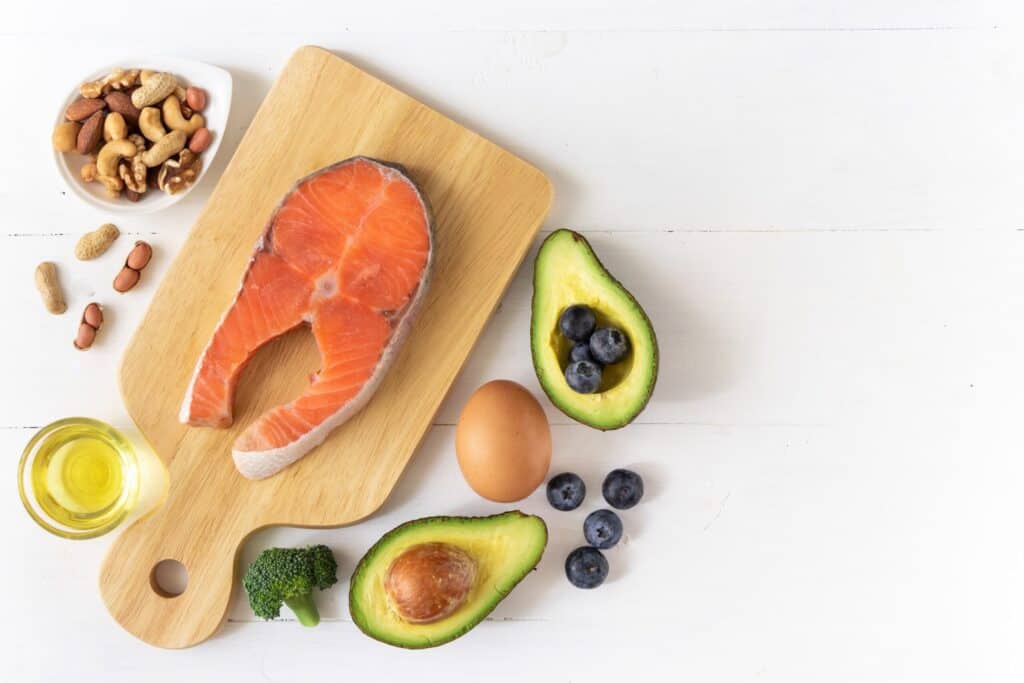Blog

High Fat and High Fad? The Ketogenic Diet and Diet Culture
Toxic diet culture has many incarnations – maybe it’s intermittent fasting on Monday, Keto on Tuesday, Cabbage Soup on Wednesday, detox teas on Thursday…and a perpetual cycle of unsustainable restriction, self-sabotage, with an extra serving of disappointment every day of the week.
One relatively recent (re)incarnation is the ketogenic or keto diet.
Like restrictive dieting in drag, and wrapped up in one deliciously buttery package, the keto diet presents itself as a quick way to lose weight (paradoxically) through abundance by means of cutting carbs and filling up on fats or should I say scientifically fallible fads.
The Lowdown on High Fat
This dietary protocol was originally developed in the 1920s as a means to treat childhood seizures and manage epilepsy (Kinsman, L et al. 1992, p. 1132), and may have several condition specific therapeutic uses (i.e. managing type II diabetes, autism, etc), yet the past number of years have seen the keto diet revived as a means for quick, if not highly restrictive, weight-loss and weight management (Boison, D. 2017, p. 187).
There is a distinct difference between following a medically supervised, potentially life enhancing, ketogenic diet for therapeutic reasons versus using it as a tool to drop pounds by eating mounds of fats.
Ketogenic diets are a low-carbohydrate, high-fat, moderate-protein dietary pattern in which the body’s primary fuel source is fat (never mind that the body and brain’s preferred fuel source for optimum functioning is glucose) (Masood, W et al. 2020, p.1) through the production of ketone bodies, in the absence of sufficient carbohydrates and a caloric deficit. The diet often mimics a fasting state.
Therapeutic uses aside, the diet typically results in rapid (synonymous for unsustainable) weight loss of up to 10lbs within a couple of weeks. Yet, diet culture fails to disclose that, due to reduction in water-attracting carbohydrates (every 1g of carbohydrate requires 3-4 grams of water to store/ metabolise it) and the diet’s diuretic effect, early weight loss is simply water loss as opposed to actual weight/ fat loss (Masood, W et al. 2020, p.1).
One such study on a calorie restricted ketogenic diet demonstrated that approximately 62% of the weight lost by subjects was water (Yang, MU & Van Itallie, TB. 1976, p. 722). As a result, as soon as individual (inevitably) revert to a ‘conventional’ or normative eating pattern, the “weight” loss is promptly regained as glycogen stores are replenished…and so the cycle of perpetual dieting begins.
Moreover, while there does not appear to be a standardized macronutrient ratio, they’re often are divided into 55% to 60% fat, 30% to 35% protein and 5% to 10% carbohydrates – this equates to approximately 20-50g of carbohydrates per day when following a 2000 kcal day diet (Ibid).
Considering that the brain uses at a least 120g of carbohydrate derived glucose, which roughly translates into your brain using approximately 60% of the total glucose utilised by the body in a resting state (Berg, JM et al. 2002, Section 30.2) and nearly twice the amount of exogenous carbohydrates prescribed.
Concerningly, certain studies suggest that a keto diet mimics starvation, minus the morbidity associated with anorexia-induced starvation (Scolnick, B. 2017, p. 1).
Essentially, a ketogenic diet followed for weight-loss purposes without medical supervision is, therefore, quite literally the mimicry of dietary depletion without death.
Sounds sustainable, right?
Fads and Fats – Keto Diets & Diet Culture
Following a keto diet may result in short-term side effects, such as nausea, vomiting, headache, brain fog, muscle cramps, fatigue, dizziness, insomnia, poor exercise endurance/ tolerance, constipation, hypoproteinemia (low levels of protein in the blood), kidney stones, and vitamin and mineral deficiencies.
Yet, physical side-effects aside, one of the longest, and most profound, long-term side-effects is liable to be a disordered relationship with food and disconnection with our bodies.
Solely cutting out food groups does not fundamentally address the behaviour changes and mechanisms required to foster a more sustainable approach to nutrition, weight and health optimisation.
When entire food groups are removed or restricted, one loses a sense of bodily and nutrition intuition (as well as losing time, effort, food freedom, and patience).
External food-rules come to take precedence over acknowledging one’s appetite and addressing the underlying causal factors that may facilitate the individual’s need to lose weight. This loss of agency and bodily knowledge may contribute to disturbed eating patterns/ behaviours, as well as the maintenance or manifestation of disordered eating, and compulsive carb-counting/ food obsession.
Conversely, research indicates a consistent co-relation between intuitive eating, that is a non-restrictive dietary approach that preaches food inclusion and bodily intuition (e.g. acknowledging as opposed to supressing innate hunger and satiety signals), and a lower BMI, better psychological health and improved quality of dietary intake in the long-term (Ibid).
Studies indicate that restrictive diets, such as the ketogenic diet, that focus on the elimination or subtraction of certain foods are generally unsuccessful in decreasing body mass and managing weight in the long-term. Repeated diet attempts (yo-yo dieting) moreover may prove to be harmful to both physical as well as mental health – and play in a role in the development of disordered eating behaviours (Van Dyke, N &Drinkwater, J. 2013, p. 1757)
Fundamentally, suppression leads to regression.
Keto and Binge Eating Disorders
On the contrary, as opposed to being a causal factor in the development and/ or maintenance of disturbed eating patterns and behaviours, a small selection of case-studies suggest that a ketogenic diet may be used a therapeutic intervention in the treatment of binge eating disorder (BED) and obesity.
Despite the fact that a majority of broader studies demonstrate that dietary restriction can exacerbate, if not trigger, binge eating, these case-studies purport that ketogenic diets, and therefore the exclusion of a large number of foods, may aid in reducing binges (Carmen, M et al. 2020, p. 1) – for instance, the three patients trailed reported a reduction in binge eating episodes and self-defined food addiction (Ibid, p. 5). Most importantly, these findings have only been found in a sparse handful of people, which does NOT indicate this is an intervention appropriate for the wider public.
The long term health implications are not known as the literature does not extend beyond 2-3 years for its efficacy and safety (Masood, W et al) and this dietary protocol should, in accord with the lack of evidence, seldom be prescribed or followed without medical supervision or followed beyond 12 months (Ibid).
Key Takeaways from Ketosis
- Ketogenic diet(s) were originally developed to offer adjunct treatment for childhood epilepsy. This dietary protocol was then shown to have other therapeutic uses – such as treating autism and diabetes type II.
- Diet culture’s appropriation of the keto diet renders it a means for rapid (and therefore unsustainable) weight loss.
- Typically results in the short-term loss of water weight and long term physical and mental health implications.
- One small study highlights that it may be useful when treating BED, however, the research is far too scarce to draw a conclusion.
Charlotte Munro, BSc
EHL Team x
References
Berg, JM et al. (2002), ‘Each Organ Has a Unique Metabolic Profile’, Biochemistry 5th Edition, New York: W H Freeman; 2002, No page numbers)
Carmen, M et al. (2020), ‘Treating Binge Eating and Food Addiction Symptoms with Low-Carbohydrate Ketogenic Diets: A Case Series’, Journal of Eating Disorders, 8(2), pp. 1-7. doi: 10.1186/s40337-020-0278-7
Deemer, S et al. (2020), ‘Impact of Ketosis on Appetite Regulation—A Review’, Nutrition Research, 77, pp. 1-11. doi: 10.1016/j.nutres.2020.02.010
Kinsman, L et al (1992), ‘Efficacy of the Ketogenic Diet for Intractable Seizure Disorders: Review of 58 Cases’, Epilepsia, 33(6), pp. 1132-1136. doi: 10.1111/j.1528-1157.1992.tb01770.x
Scholnick, B. (2017), ‘Ketogenic Diet and Anorexia Nervosa’, Medical Hypotheses, 109, pp. 150-152. doi: 10.1016/j.mehy.2017.10.011
Van Dyke, N & Drinkwater, J (2013), ‘Review Article Relationships Between Intuitive Eating and Health Indicators: Literature Review’, Public Health Nutrition, 17(8), pp. 1757-1766. doi: 10.1017/S1368980013002139
Yang, MU & Van Itallie, TB (1976). ‘Composition of Weight Lost During Short-Term Weight Reduction. Metabolic Responses of Obese Subjects to Starvation and Low-Calorie Ketogenic and Nonketogenic Diets’, The Journal of Clinical Investigation, 58(3), pp. 722-730). doi: 10.1172/JCI108519














